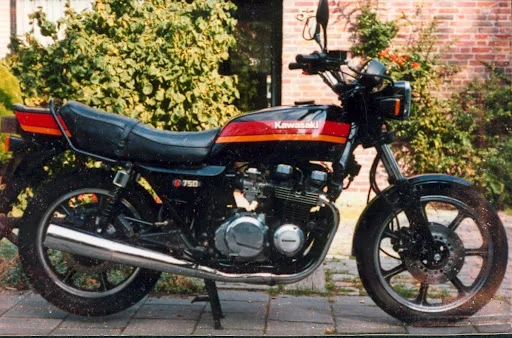1987 Kawasaki Z 750 Turbo

Review of 1987 Kawasaki Z 750 Turbo
The Kawasaki Z 750 Turbo, introduced in 1987, stands as a significant milestone in the realm of motorcycle engineering and performance. Representing the pinnacle of Kawasaki's technological advancements during that era, the Z 750 Turbo was powered by a 738cc inline-four engine equipped with a turbocharger, which allowed it to deliver exceptional power and acceleration for its time. With a distinctive design featuring sharp lines and a robust frame, the bike not only boasted impressive performance metrics but also commanded attention on the road with its striking aesthetic. The incorporation of advanced features such as a liquid-cooled engine and a sophisticated suspension system further solidified its reputation as a formidable contender in the sportbike category. Today, the value of the Kawasaki Z 750 Turbo transcends mere monetary worth; it represents a piece of motorcycling history that appeals to collectors and enthusiasts alike. Its unique blend of turbocharged performance, retro styling, and the nostalgia of the late '80s motorcycle culture has made it a sought-after model among vintage motorcycle aficionados. As the motorcycle market continues to evolve, the Z 750 Turbo remains a testament to Kawasaki's innovative spirit and serves as a reminder of the thrilling capabilities of early turbocharged motorcycles. Whether admired for its engineering prowess or cherished for its historical significance, the Z 750 Turbo continues to captivate riders, ensuring its legacy endures in the world of motorcycling.
Advantages
- Turbocharged Performance: The Z 750 Turbo features a factory-installed turbocharger, providing a significant boost in power and acceleration compared to standard models, making it an exciting ride for performance enthusiasts.
- Unique Styling: With its distinctive 1980s aesthetics, the Z 750 Turbo stands out on the road. Its bold lines and sporty design appeal to riders who appreciate classic motorcycle styling.
- Comfortable Riding Position: The motorcycle is designed with a comfortable riding position, making it suitable for both short trips and longer rides, which enhances the overall riding experience.
- Advanced Technology for Its Time: As one of the early adopters of turbocharging in motorcycles, the Z 750 Turbo incorporated advanced technology for its era, showcasing Kawasaki's innovation and engineering prowess.
- Strong Community and Enthusiast Support: The Z 750 Turbo has a dedicated following among motorcycle enthusiasts, which means owners can find valuable resources, parts, and advice from a passionate community.
Disadvantages
- Weight: The Z 750 Turbo is relatively heavy compared to modern motorcycles, which can affect handling and maneuverability, especially for less experienced riders.
- Fuel Economy: The turbocharged engine can lead to higher fuel consumption, making it less economical for daily commuting compared to more contemporary models.
- Maintenance Complexity: The turbo system adds complexity to the engine's maintenance and repairs, potentially leading to higher costs and requiring specialized knowledge for servicing.
- Limited Availability of Parts: As a vintage motorcycle, finding replacement parts can be challenging, and some components may be discontinued or hard to source.
- Performance Lag: While it was advanced for its time, the turbo lag can be noticeable, especially when compared to modern sport bikes that offer more immediate power delivery and responsiveness.
Alternatives
- Honda CB750 (1970-2003) - The Honda CB750 is often hailed as the original superbike, known for its reliability and smooth inline-four engine. With a classic design and a strong aftermarket support, it combines vintage charm with solid performance, making it a favorite among enthusiasts.
- Suzuki GSX-R750 (1985-Present) - The Suzuki GSX-R750 has been a staple in the sportbike segment since its introduction. Its lightweight frame, powerful engine, and agile handling make it a versatile choice for both street and track riding. The bike has evolved over the years, but it retains a performance-oriented spirit reminiscent of the Z 750 Turbo.
- Kawasaki ZX-7R (1991-2003) - The Kawasaki ZX-7R is a sportbike that delivers a thrilling ride with its potent engine and advanced aerodynamics. Known for its track capabilities, it features a more aggressive riding position compared to the Z 750 Turbo, yet offers a nostalgic connection through its Kawasaki lineage.
- Yamaha FZ750 (1985-1990) - The Yamaha FZ750 was one of the first production motorcycles to feature a 5-valve per cylinder engine, which provided a unique combination of power and efficiency. Its innovative design and comfortable ride make it a noteworthy alternative, as it offers a blend of classic styling and modern performance.
- BMW K75 (1985-1995) - The BMW K75 is a unique entry with its water-cooled inline-three engine that delivers a smooth and torquey ride. Its ergonomic design and shaft drive make it a great touring option while still providing spirited performance. It's a bit different from the Z 750 Turbo, but it offers a distinctive riding experience. These alternatives reflect a range of styles and technologies, appealing to various preferences while capturing some of the essence of the Kawasaki Z 750 Turbo.

Comments & Discussion